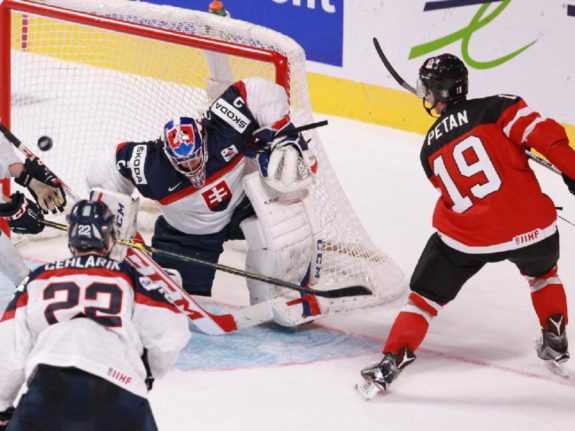The 2018-19 NHL season is a make-or-break year for many young Winnipeg Jets players. Marko Dano needs to prove himself worthy of a long-term deal, JC Lipon needs to turn years of solid AHL play into a full-time NHL position, and Patrik Laine needs to see how far he can stretch the AAV on his impending new contract.
Among this crop of young talent needing to prove the scouts right, is Nic Petan.
The State of Petan Today
It is no secret that the Jets have one of the deepest and deadliest offenses in the NHL. With 273 goals last season, the Jets were second in the league in goals for, behind only their fellow blue-wearing offensive juggernaut, the Tampa Bay Lightning who had 290 goals for. Scoring was also spread evenly throughout the lineup, with only Laine and Kyle Connor cracking 30 goals, with 44 and 31 respectively, while Nikolaj Ehlers was close with 29.
Yet with the departure of talented forwards Joel Armia and Paul Stastny this offseason, the battle for roster spot will be as hot as ever. The problem for Petan will be the players occupying slots ahead of him on the depth chart. As The Hockey Writers’ Rob Mahone argued, players like Brendan Lemieux and Mason Appleton have leapfrogged Petan in the eyes of management, and new forward darling Kristian Vesalainen has captured the attention of fans and pundits alike.

Petan has been marginally effective for the Jets, offensively speaking. In 95 career games, the B.C.-born winger has five goals and 16 assists for 21 points at a 0.22 PPG pace. These numbers are not good enough to secure a spot on an elite team like Winnipeg’s.
Petan’s Junior Numbers Forecasted Decline
A cursory glance at Petan’s junior production makes you wonder why the young winger’s star has fallen so far. Throughout his 252 game WHL career, he amassed 110 goals and 248 assists, adding 84 points in 88 playoff games, and 16 points in 14 games for Team Canada at the U20 World Junior Hockey Championships.
With a 1.42 PPG pace at the WHL level, it’s no wonder that the Jets were salivating when Petan – who posted 46 goals and 74 assists in his draft year – fell to them at 43rd overall in the 2013 NHL draft. Then, during the 2015 U20 World Juniors, fans that were on the fence about the undersized playmaker were put on notice when he notched a hat-trick against Slovakia, punctuated by his father descending the Air Canada Centre steps to toss his own hat on the ice.

Despite his junior production and heart-warming moments, Petan has yet to make his mark on a Jets team with great ‘Finnishers’ like Laine, let alone blossom offensively at the professional level. A glance at his year-by-year production yields some answers. In his draft year, he put up the aforementioned 120 points in 71 games, then began his decline, with 113 points in 63 games, and then 89 points in 54 games before making the jump to the AHL. Taking games missed into consideration, these numbers become 1.69, 1.79, and 1.65 PPG respectively, lessening the shock but still showing a decline.
There could be many reasons for this drop-off. Petan was named the Portland Winterhawks captain for the final season of his WHL career, pushing him into a larger leadership role and lessening his focus on production. There was also the extra physical and mental strain of the World Junior tournament and three years of deep playoff runs with the Winterhawks.
A slight drop of 0.04 PPG may not be enough to worry an NHL GM like Kevin Cheveldayoff, but if his numbers are analyzed more thoroughly, the drop-off becomes significant and may reveal that Petan will amount to nothing more than a bottom-six forward on any club.

EQ Points and Petan’s True Nature
For the 2016 edition of “Stat Shot”, hockey analytics guru Iain Fyffe constructed a series of calculations that are meant to take a player’s junior/college hockey numbers and statistically control for various conditions. In particular, Fyffe gave bonuses to points recorded in playoff and World Junior competition, added a modifier based on the competitiveness of a league – lead by the OHL as the most difficult and WHL as second most – and statistically controlled for a player’s age, to create the stat ‘EQ Points’.
Through this, a player’s production is ‘equalized’ and can be compared more accurately to his peers. For Petan, the results speak for themselves: From 120.99 EQ points in his draft year, there is a steep drop to 80.66 in 2013-14 and then 59.94 in his final junior season. Despite being boosted by points recorded in the playoffs and during the WJC, they were not enough to reduce the impact of the age adjustment. Petan did not improve statistically, even though he was playing against younger and less experienced players.

This can be taken a step further by looking at how Petan’s junior and AHL production should have translated into NHL points. By multiplying his scoring rate in junior and the minors by certain translation factors – as determined by Rob Vollman – we can see how these rates should have developed in the NHL.
It seems that Petan is still performing under expectations. The stats peg him as a 31-point player over an 82-game season, and at this pace, he should have 36 points in his NHL career, compared to the 21 points he has. He simply hasn’t been the player Jets fans were hoping he would develop into, and while he is not bad by any stretch – and as many have pointed out, he hasn’t always had the most talented linemates – considering these advanced stats, the future looks bleak for the winger.
Cap Crunch & Hard Decisions Should Force a Trade
When a team starts winning tough decisions have to be made, and that is where Cheveldayoff finds himself heading into the 2018-19 season. The battle for the goaltending backup has been covered at length, and so has how the club should handle its prospects.
The Jets depth chart shows that there are a few large barriers for Petan to clear before becoming a full-time NHLer on the Jets roster. Sticking with the bottom-six valuation indicated by his numbers, strong and talented players stand in his way, with Adam Lowry and Andrew Copp pegged as the Jets’ third and fourth line centres, as well as Mathieu Perrault, Marko Dano, and JC Lipon on the left side.
Lowry and Copp both dwarf Petan physically, experientially and statistically – both have played in excess of 200 NHL games and clear six feet tall – while Perrault is a versatile veteran on a team-friendly deal, and both Dano and Lipon are poised to fight for the final roster spot. Petan is, unfortunately, the odd man out and will likely be unwilling to continue being paid the league minimum to toil in the minors. The answer for Petan is a change of scenery.
The best option would be to trade Petan and recoup some assets. Declan Schroeder has pegged the centre-starved Montreal Canadiens as a prime target and with their reported interest in the young-gun this offseason, a trade seems likely. The Habs already have smaller forwards like Jonathan Drouin and Brendan Gallagher, so sticking Petan in their bottom-six makes sense.
However, only time will tell the story of Nic Petan’s place with the Winnipeg Jets.